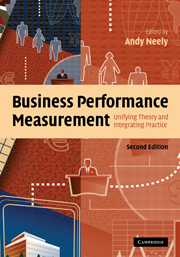Book contents
- Frontmatter
- Contents
- List of figures
- List of tables
- List of boxes
- List of contributors
- Introduction
- Part I Performance measurement – functional analyses and theoretical foundations
- Part II Performance measurement – frameworks and methodologies
- Part III Performance measurement – practicalities and challenges
- Part IV Performance measurement in public services
- Part V Performance measurement – emerging issues and enduring questions
- Index
Part IV - Performance measurement in public services
Published online by Cambridge University Press: 22 September 2009
- Frontmatter
- Contents
- List of figures
- List of tables
- List of boxes
- List of contributors
- Introduction
- Part I Performance measurement – functional analyses and theoretical foundations
- Part II Performance measurement – frameworks and methodologies
- Part III Performance measurement – practicalities and challenges
- Part IV Performance measurement in public services
- Part V Performance measurement – emerging issues and enduring questions
- Index
Summary
Part III of this book explored some of the generic practicalities and challenges of performance measurement. Since the first edition of this book was published there has been an explosion of interest in the measurement of performance in public services, and so it is to this topic that we now turn our attention. This part consists of four chapters, three of which reflect on the challenges of measurement in different public service settings – education, the police force and health. The fourth contribution explores issues of perversity in public service performance measurement.
The opening chapter, by Andrew Brown, explores performance management in English primary schools. Brown identifies five reasons why performance might be measured: (i) measuring for the purposes of focusing attention; (ii) measuring to improve pupils' academic progress; (iii) measuring for professional development purposes; (iv) measuring for strategy implementation purposes; and (v) measuring to implement performance-related pay. Using a combination of desk and field reasearch he explores the theoretical and practical challenges of each of the reasons for measurement, pointing out the inherent tensions and conflicts between them. Brown's chapter is important because it elucidates many of the reasons why performance measurement and management are so problematic in the English education system.
The second contribution, from Paul Collier, explores a different public service regime: the police force. Collier begins by tracing the evolution of performance measurement in the police.
Information
- Type
- Chapter
- Information
- Business Performance MeasurementUnifying Theory and Integrating Practice, pp. 337 - 338Publisher: Cambridge University PressPrint publication year: 2007
